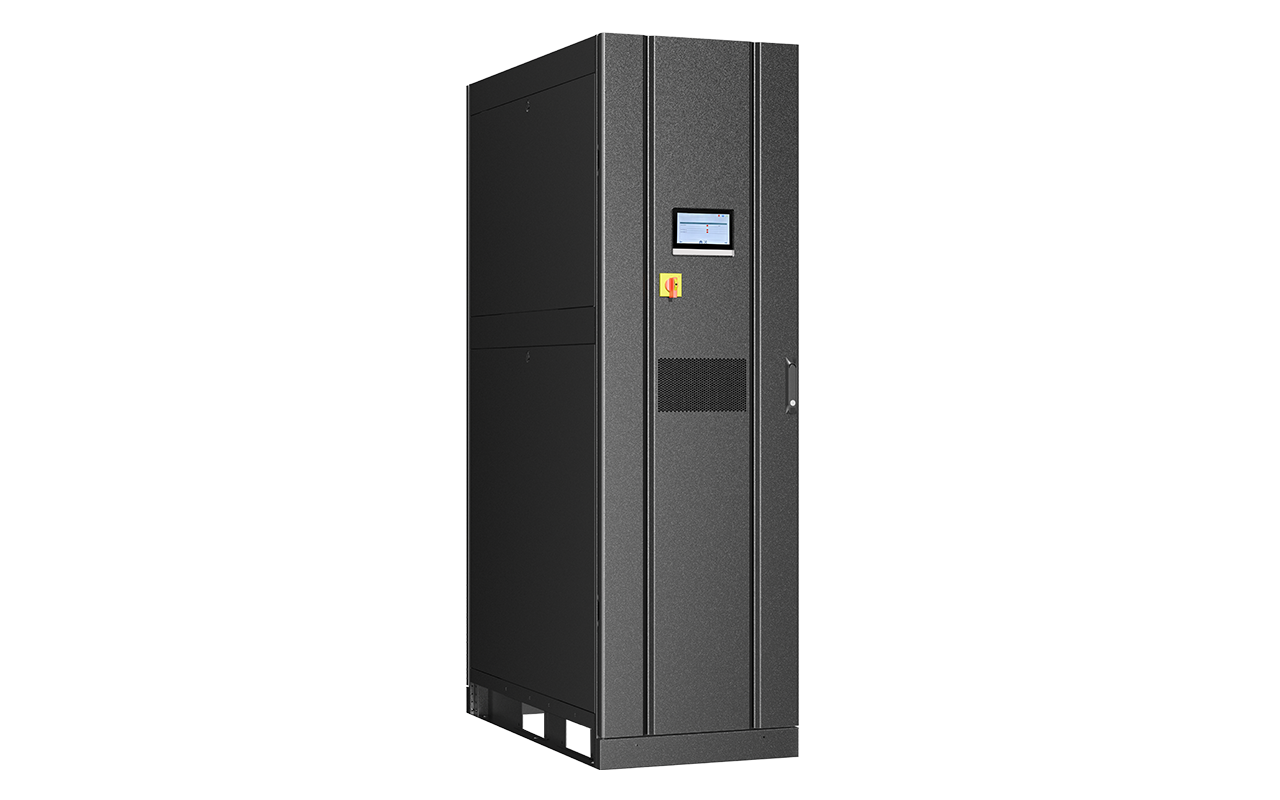BLOG
Amazon Web Services develops cooling technology for next generation Nvidia GPUs
Amazon Web Services (AWS) has developed its own cooling solution for the latest generation of Nvidia GPUs. With the cloud giant having deployed Nvidia's Blackwell GPUs - and earlier this month, made UltraServer instances based on the Nvidia GB200 NVL72 system available, a move to liquid cooling has been necessitated.
In a video posted to YouTube, AWS' VP of compute and machine learning, David Brown, said: "In order to support the incredible compute density with GB200 NVL72 racks, we've moved towards a new first at AWS: liquid cooling.
"Blackwell represents the first liquid cooling hardware platform we've deployed at scale on AWS.“
AWS instead developed its own "In Row Heat Exchanger" (IRHX) that can be installed without adjusting the air-cooled mechanical design and with "minimal changes" to existing infrastructure.
The IRHX has a water distribution cabinet, a pumping unit, and fan coils. Cooling liquid is pushed from the pumping unit to the servers, and distributed through the chips via a cold plate designed by AWS and Nvidia. The warm liquid then returns to the IRHX through the coils and is cooled by fans, with heat expelled out of the back.
Following the revelation that AWS was using its own cooling solution, Vertiv - a provider of power and cooling solutions to the data center industry - saw its stock take an 11 percent hit on Thursday, July 10.
AWS is no stranger to developing its own hardware and equipment. The company has its own chips - Graviton, Trainium, and Inferentia, and last year launched a series of data center components to help its data centers handle the next generation of AI workloads.

Boyd launches 2.3MW CDU
Cooling firm Boyd has launched a new coolant distribution unit (CDU). The company this month announced the expansion of its liquid cooling product portfolio with a new high-capacity CDU known as the ROL2300.
The ROL2300 is a liquid-to-liquid in-row system; the company said one CDU can efficiently cool more than 10 Nvidia NVL72 racks, offering up to 2.3MW of cooling across multiple racks.
The new CDU features front and rear access doors and hot swappable N+1 redundant pumps, redundant sensors, and filters in the standard configuration.
An automated transfer switch option assures the CDU remains powered for continuity of operation if the primary data center power source fails. Modbus and BACnet standard communication protocols enable easy integration with facility software systems.
Produced in North America, Europe, and Asia Pacific, Boyd said the CDU is “immediately available to purchase in volume.”
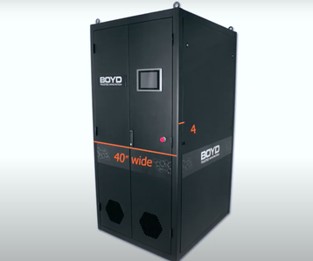
SambaNova launches turnkey AI inference offering for data centers
AI solutions provider SambaNova has launched a turnkey AI inference data center product, dubbed "SambaManaged." According to the company, SambaManaged can be deployed in just 90 days and enables existing data centers to begin offering AI inference services with "minimal infrastructure modification.“
SambaManaged is a modular solution, scalable up to a 1MW "token factory" with 100 racks and 1,600 chips, or even larger. The chips in question are SambaNova's SN40L AI chips, 16 of which are in each "SambaRack".
The SN40Ls are reconfigurable dataflow units (RDUs) and are manufactured by TSMC.
The company claims to already have a "major US public company" as a customer that will use SambaManaged to run DeepSeek and other similar models.
“Data centers are struggling with power, cooling, and expertise challenges as AI demand grows,” said Abhi Ingle, chief product and strategy officer at SambaNova. “SambaManaged delivers high-performance AI with just 10kW of air-cooled power and minimal infrastructure changes — making rapid deployment simple for any data center.”
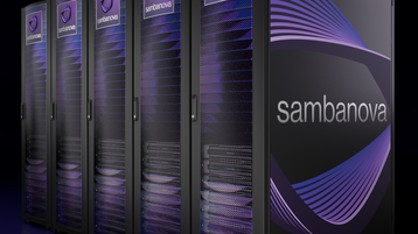
ICS Arabia and Dubai's XDS to deliver immersion cooled data centers in Saudi Arabia
ICS Arabia and XDS will construct two immersion-cooled data centers in Saudi Arabia. A data center operator and manufacturer based in Saudi Arabia, ICS has struck a deal with XDS, which is based in the UK and the UAE and specializes in cooling.
The two companies will deliver a 10MW data center in Riyadh, the country’s capital.
Desert Dragon Data Centers, which is a subsidiary of ICS, will design and construct the facility before handing it over to XDS by June 2026. XDS will operate the facility for 15 years.
CEO of XDS, Ghufran Hamid, said: “We are pioneering the inevitable switch from air-cooled to liquid immersion. Those companies who are still investing in just air-cooled will become the Blockbuster of the data center market.”
Humain, the AI-focused subsidiary of the country’s Public Investment Fund (PIF), said that it would buy 18,000 Nvidia GB300 chips with "several hundred thousand" more on the way, that it was partnering with AWS for a $5bn 'AI Zone,' signed a deal with AMD for 500MW of compute, and deployed Groq chips for inference. It also signed MoUs with Qualcomm and Cisco.
Digital transformation is a crucial part of Vision 2030, which is the country’s plan to diversify its economy away from a reliance on oil revenues.

Blaze at Cairo telecommunications building kills 4, disrupts internet, phone
Cairo, Egypt (Reuters) — Four workers were killed and at least 22 others were injured in a fire that broke out on Monday at a key data centre in Cairo, Hossam Abdel Ghaffar, the spokesperson at Egypt’s Health Ministry, told Reuters on Tuesday. The blaze at a Telecom Egypt ETEL.CA facility, which state TV said was contained on Monday, caused disruptions to communications across the capital.
The fire halted phone calls, and disrupted internet access, with internet monitoring group Netblocks saying network data showed national connectivity at 62% of ordinary levels.
The health ministry posted alternative numbers for ambulance services across different governorates in case people were unable to reach its main hotline.
The injuries were mostly because of smoke inhalation, health ministry spokesperson Ghaffar said on Monday.
An initial examination indicated that the fire was likely to have been caused by an electrical short circuit, MENA cited a security source as saying.

AI cloud provider Firmus signs MoU with Singapore port authority for seawater-cooled AI compute
Firmus Technologies, a Singapore-headquartered AI cloud provider, has signed a Memorandum of Understanding (MoU) with the Maritime and Port Authority of Singapore (MPA) for AI infrastructure cooled by seawater. Announced by the company last month, the MoU will see Firmus and the MPA evaluating the feasibility of deploying scalable AI infrastructure within waterfront facilities under the MPA's jurisdiction.
The two will study infrastructure concepts focused on reducing power and land requirements through the use of modular, liquid-cooled systems, as well as looking to meet the AI needs of the maritime, industrial, and public sector applications.
Tim Rosenfield, co-CEO of Firmus Technologies, said: “This collaboration with MPA marks a significant opportunity to explore how sovereign-scale compute can be delivered through sustainable, maritime-adjacent systems. Firmus is committed to advancing high-efficiency AI infrastructure with minimal environmental overhead. We look forward to contributing our technical expertise to support Singapore’s long-term digital and sustainability ambitions.”
Firmus currently operates an R&D facility in Tasmania. Founded in 2019 by Oliver Curtis, Tim Rosenfield, and Jonathan Levee, the Tasmania site was originally its flagship data center. The company initially was focused on high-performance compute and specialized in immersion cooling, but today describes itself as a pure AI factory builder.
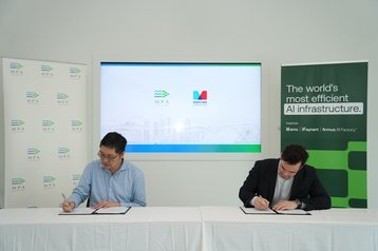
FuelCell Energy, Inuverse to explore 100MW fuel cell deployment at AI data center in South Korea
US cleantech firm FuelCell Energy has partnered with AI data center developer Inuverse to explore the deployment of up to 100MW of fuel cell power at a data center in Daegu, South Korea. The companies signed a non-binding Memorandum of Understanding (MoU) that sets the parameters for the potential deployment. The deployment would occur over phased increments, commencing in 2027 at Inuverse’s AI Daegu Data Center (AI DDC), which is currently under development.
According to Inuverse, once built, the data center will feature advanced rack cooling, hot zone optimization, absorption chilling enabled by the thermal energy from FuelCell Energy’s platform, and a clean waste model that reduces operational costs and improves performance.
Reacting to the announcement, David Kim, EVP and chief business development officer of Inuverse, said: “This collaboration is pivotal for Inuverse to address the surging data processing demands of the AI era while proactively achieving our renewable energy and ESG objectives. We believe this project will set global ESG standards for data centers.”
The biggest player in the sector is Bloom Energy, which has signed a number of deals to power data centers within the US market. Last November, the company signed a 1GW supply deal with American Electric Power to power AI data center sites.
While fuel cells promise a much lower emission profile than fossil fuel alternatives due to the lack of combustion in their generation process and ability to be run on hydrogen, concerns remain over how low-carbon they really are.
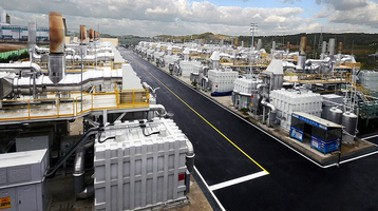
Groq leases space at Equinix data center in Helsinki, Finland
Groq has expanded its AI inference platform into Europe with a new data center location in Helsinki, Finland. The AI company has leased space at an Equinix data center in Helsinki, its first European location to date.
Groq has previously deployed its hardware in an Equinix data center in Dallas, Texas. Through the two companies' partnership, Equinix Fabric customers will be able to deploy inference workloads to GroqCloud, and new customers across the US and EMEA will have the ability to affordably access inference capacity through Equinix Fabric's available public, private, or sovereign infrastructure.
"There is no doubt AI is front of mind for businesses across Europe; and the Nordics is a great place to host AI infrastructure. With its sustainable energy policies, free cooling, and reliable power grid, Finland is a standout choice for hosting this new capacity," said Regina Donato Dahlström, managing director for the Nordics at Equinix.
Equinix has five data centers in Helsinki. It has not been stated which facility Groq is leasing space in.
Groq currently has a presence in the US (Equinix and DataBank), Canada (Bell Canada), and Saudi Arabia (Humain).
Last year saw the company closing a $640m funding round. Led by BlackRock, the round also saw participation from Neuberger Berman, Type One Ventures, Cisco, KDDI, and Samsung Catalyst Fund.
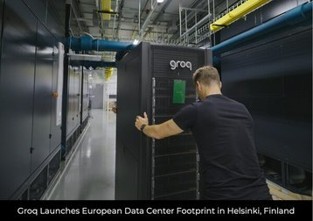
Brazil’s National Scientific Computing lab completes upgrade of Santos Dumont supercomputer
Seven months after Brazil’s National Laboratory for Scientific Computing (LNCC) began upgrading its Santos Dumont supercomputer, the work has been completed. According to Eviden, the supercomputing unit of French IT services provider Atos, which provided the hardware for the upgrade, the system now has additional AI-dedicated capabilities and offers 18.85 petaflops of compute performance.
The upgrade consists of five different partitions, with the largest comprising 62 BullSequana XH3145-H blades, each equipped with 4th Gen Intel Xeon Scalable Processors and four NVLink-connected Nvidia H100 GPUs. The second largest is based on 20 BullSequana XH3420 blades, with each of its 60 nodes equipped with two AMD Epyc 9684X processors.
The Direct Liquid Cooling system used to cool the upgraded supercomputer now captures more than 98.5 percent of the heat from power supplies, processors, accelerators, network devices, disks, and memory, compared to the 2015 version, which could dissipate only 80 percent of the heat on water.

Leave A Reply
LOGO
This stunning beach house property is a true oasis, nestled in a serene coastal community with direct access to the beach.
Opening Hours
Monday - Friday : 9AM to 5PM
Sunday: Closed
Closed during holidays
Contact
+18888888888
hezuo@eyingbao.com123 West Street, Melbourne Victoria 3000 Australia



